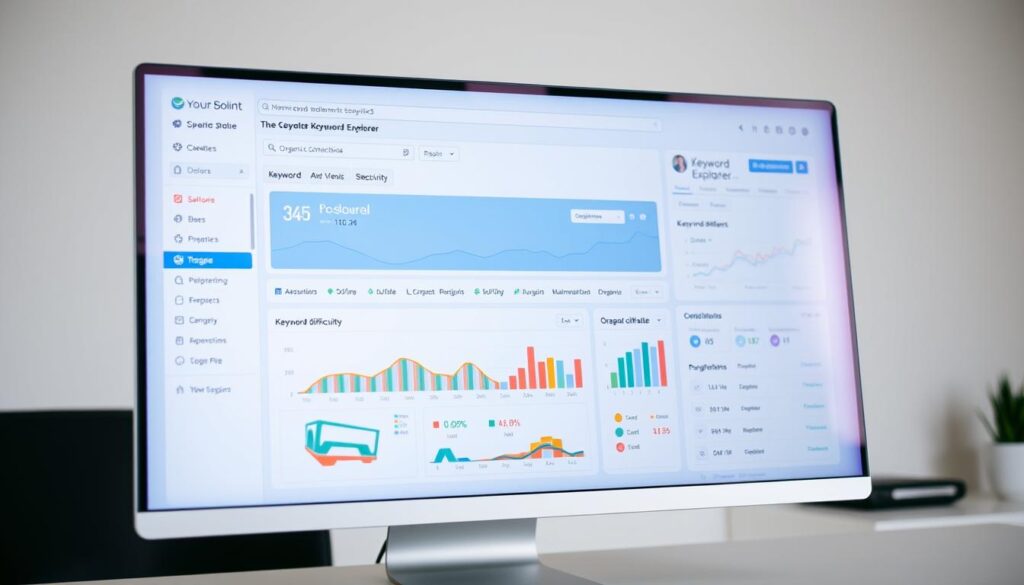In today’s world, over 80% of online experiences start with a search engine. Using the right keyword research tools is crucial for SEO success. With so many tools out there, finding the best free ones can be tough. We’ve found the top 4 best free keyword research tools for 2024 – Moz Keyword Explorer, Google Keyword Planner, Semrush, and Free Keyword Research Tool.
A futuristic workspace featuring a sleek computer screen displaying colorful graphs and charts representing keyword data, surrounded by digital tools and icons symbolizing keyword research, with a backdrop of a creative brainstorming environment filled with inspiration and innovation.
These tools are designed for different levels of expertise. They offer various features, from all-around solutions to specialized tools for paid and basic keyword research. By using these free tools, you can find valuable insights, spot low-competition keywords, and improve your content. This will help drive more targeted traffic and boost your search engine rankings.
Key Takeaways
- The top 4 free best keyword research tools for 2024 are Moz Keyword Explorer, Google Keyword Planner, Semrush, and Free Keyword Research Tool.
- These tools offer a range of features and cater to different levels of expertise, from beginners to advanced SEO professionals.
- By using these free best keyword research tools, you can identify relevant keywords, analyze search volume and competition, and optimize your content strategy for improved SEO performance.
- Incorporating a mix of free and paid keyword research tools can provide a comprehensive approach to keyword analysis and help you achieve optimal results.
- Avoid common mistakes like focusing solely on short-tail keywords or neglecting user intent when conducting keyword research.
Table of Contents
Why Keyword Research Matters for SEO Success
Keyword research is key to a good SEO plan. It helps find the terms people search for. This way, your content can attract more visitors and rank higher on search engines.
It connects what people look for with what you offer. Knowing what people want, you can make content that meets their needs. This boosts your chances of ranking higher and brings in more relevant visitors.
“If you want to generate traffic through search, it’s best to do keyword research before you start writing. This way, you can focus on keywords for which a certain amount of search volume already exists.”
– Carolyn Lyden, Search Engine Journal
It also uncovers long-tail keywords. These are more specific and have less competition. Even though they get fewer searches, they attract more focused traffic. Adding these to your strategy can help you reach more people and get more sales.
| Keyword Type | Characteristics | Benefits |
|---|---|---|
| Short-tail keywords | 1-2 words, high search volume, highly competitive | Attracts a large audience, establishes brand visibility |
| Long-tail keywords | 3+ words, lower search volume, less competitive | Attracts targeted traffic, easier to rank for, drives conversions |
To do good keyword research, use tools like Google Keyword Planner, Ahrefs, SEMrush, and Moz Keyword Explorer. These tools give you insights into search volumes and competition. They help you choose the best keywords for your content.
By putting effort into keyword research, you lay a solid base for your SEO. Your content will then connect with your audience better, leading to lasting success in search rankings.
Moz Keyword Explorer: The Best All-Around Free Keyword Research Tool
Moz Keyword Explorer is the top free keyword research tool. It has a user-friendly interface and gives detailed data for all levels of SEO experts. Its clear data and easy-to-use tools help you make smart choices and improve your SEO.

“A sleek, modern interface of Moz Keyword Explorer on a computer screen, featuring a vibrant dashboard displaying keyword difficulty and organic clickthrough rate metrics, incorporating colorful graphs and data visualizations, set against a minimalist workspace background.”
Approachable Data Presentation
Moz Keyword Explorer is known for its simple and clear data. It doesn’t confuse users with hard-to-understand metrics. This makes it easy for anyone to quickly understand the key information needed for SEO decisions.
Straightforward Keyword Prioritization Metrics
Moz Keyword Explorer offers important metrics for choosing keywords. Two key ones are keyword difficulty and organic clickthrough rate (CTR). Keyword difficulty shows how hard it is to rank for a keyword, based on competitors.
Organic CTR shows how much traffic a keyword can bring to your site. By looking at both, you can pick keywords that are likely to rank well and bring in traffic. This ensures your SEO work is effective.
Broad Set of Free Tools
Moz’s free plan has many tools, not just for keyword research. You get up to 10 queries per tool per month. This includes:
- Keyword suggestions: Find up to 1,000 related keywords to your seed keyword, expanding your list.
- SERP analysis: Do up to 10 analyses to understand the competition and the chances of ranking for keywords.
- Keyword lists: Organize and track your keyword research over time.
Also, Moz Keyword Explorer shows the minimum domain authority needed for ranking. This helps you set goals and focus on achievable keywords for your site.
With Moz Keyword Explorer, you can simplify your keyword research. Its clear data, easy-to-use metrics, and free tools help you make informed decisions to boost your SEO.
Google Keyword Planner: Ideal for Researching Paid Keywords
Google Keyword Planner is a top tool for PPC keyword research. The best part? It’s free, even if you don’t use Google Ads. It helps you plan, forecast, and budget for your ads better.
Google Keyword Planner has two main parts. It helps you find new keywords and gives detailed data on search volume and forecasts. The “Discover New Keywords” feature is great for starting new campaigns or adding to your list.
The “Get search volume and forecasts” tool goes deeper. It shows monthly searches, average cost-per-click, and competition level for each keyword. This info is key for making your Google Ads campaigns better.
Google Keyword Planner updates its forecasts daily. It uses data from the last 7-10 days and adjusts for seasonality. This keeps your paid ads strategy up-to-date.
Google Keyword Planner is great for refining your keyword lists. You can filter by categories, source websites, and more. This helps you create targeted ad groups for better performance and ROI.
| Feature | Benefit |
|---|---|
| Keyword Ideas | Generate new keyword ideas based on your products, services, or website content |
| Search Volume and Forecasts | Get estimates on monthly searches, average CPC, and competition level for each keyword |
| Keyword Refinement | Filter keywords by categories, source websites, and more for highly targeted campaigns |
| Performance Forecasting | View keyword performance forecasts based on spend and bid strategy |
Google Keyword Planner is mainly for paid keyword research. But it can also help with organic SEO. It can show you where to rank organically and save on PPC costs.
To get the most from Google Keyword Planner, follow these tips:
- Use the “Discover New Keywords” feature to grow your list and find new chances.
- Look at search volume, CPC, and competition to pick the best keywords for your campaigns.
- Use filters and categories to make targeted ad groups and improve relevance.
- Use performance forecasting to set the best bids and budget for maximum impact.
By using Google Keyword Planner for your paid ads, you can make your PPC campaigns better. This will bring more qualified traffic to your website.
Semrush: The Go-To Tool for Advanced SEO Professionals
Many SEO experts choose Semrush for advanced keyword research. It has over 25.7 billion keywords across 142 international databases. This gives you detailed data to improve your SEO strategy.

A modern, sleek computer screen displaying the Semrush keyword research interface, with vibrant graphs and charts illustrating keyword analytics, a background of a stylish office environment, and colorful sticky notes featuring SEO concepts scattered around, showcasing an advanced SEO workspace atmosphere.
Granular Keyword Data
Semrush offers detailed keyword analysis. The Keyword Overview tool lets you analyze up to 100 keywords at once. You get data on search volume, cost-per-click, and more.
This helps you choose the right keywords and optimize your content. The Keyword Magic Tool also helps by exploring niche and long-tail keywords.
Wide Range of Specialized Keyword Research Tools
Semrush has many specialized tools for keyword research. These tools help you find new opportunities and solve specific challenges. Some key tools include:
- Keyword Gap: Finds keywords your competitors rank for but you don’t.
- Organic Research: Analyzes competitors’ top keywords to find opportunities for your site.
- Advertising Research: Shows paid competition to help refine your PPC campaigns.
- SERP Features: Details on SERP features like snippets and site links to optimize your content.
Generous Free Plan
Semrush’s free plan is very appealing. It lets you try out its powerful features without spending a lot. You can do up to 10 free keyword searches daily and get 10 Analytics reports.
This free plan is great for exploring Semrush’s capabilities. It helps you decide if it’s right for you.
| Tool | Free Plan | Paid Plan (Starting Price) |
|---|---|---|
| Keyword Magic Tool | 10 free searches per day | $117.33/month (billed annually) |
| Keyword Overview | 10 free searches per day | $117.33/month (billed annually) |
| Organic Research | 10 free searches per day | $117.33/month (billed annually) |
Semrush’s advanced keyword research tools and granular data make it an essential resource for SEO professionals looking to gain a competitive edge in their industry.
Using Semrush’s features, like competitive keyword gap analysis, can improve your content strategy. It helps you find valuable opportunities and drive more targeted traffic to your site.
Free Keyword Research Tool: Simplicity at Its Finest
Looking for an easy way to do keyword research? The Free Keyword Research Tool is perfect. It’s simple and helps you find the right keywords fast. Plus, it gives you content ideas without the hassle of complicated tools.
This tool shines by suggesting content angles based on your keywords. It looks at search trends and what people want. This way, you can create content that really speaks to your audience.
“The Free Keyword Research Tool is a game-changer for beginners looking to optimize their content for search engines. Its simplicity and ease of use make it an invaluable resource for anyone just starting out with keyword research.” – Samantha Patel, SEO Specialist
The Free Keyword Research Tool is all about keeping things simple. It focuses on the basics to help you:
- Find the right keywords for your content
- See how often people search for them
- Get ideas for new content
- Make keyword research easier
Suggested Content Angles
The tool’s content angle suggestions are great for creators and marketers. They offer new ways to look at your keywords. This helps you:
- Find new content ideas
- Stand out from the competition
- Keep your content fresh and interesting
- Target specific keywords to improve your search rankings
| Keyword | Suggested Content Angle |
|---|---|
| basic keyword research | 5 Essential Steps for Conducting Effective Keyword Research |
| simple keyword tool | The Best Free Keyword Tools for Beginners in 2024 |
Whether you’re new to keyword research or a pro looking to simplify things, this tool is great. It’s easy to use and offers smart content suggestions. It’s a smart choice for anyone wanting to improve their SEO without spending a lot.
Understanding the Key Features of the Best Keyword Research Tools
When looking at keyword research tools, it’s key to know what makes them stand out. The best tools give you lots of data like search volume, keyword difficulty, and how your competitors rank. This info helps you pick the right keywords and plan your content wisely.
Top tools also give great advice on how to use your keywords. They offer simple tips and ideas to help you improve your content. This advice includes suggestions for your content’s angle, related keywords, and how to better your on-page optimization.
Another important thing is the free plan options and pricing. The best tools have free plans that let you use important features and do real research without paying. When you decide to pay, the costs should be clear and not too high, so you can grow your research without spending too much.
| Tool | Key Features |
|---|---|
| Semrush | Keyword suggestions from a database of over 25 billion termsCompetitor keyword analysisPersonal Keyword Difficulty (PKD%) and Topical Authority metrics |
| Ahrefs Keywords Explorer | Search volume estimatesDetailed competition data, including backlink requirements for rankingInsights into competitors’ strategies |
| Google Search Console | Identifies opportunity keywords where a site ranks between #8-#20Indicates potential for optimization |
By focusing on tools with lots of data, good advice, and free plans, you can do great keyword research. This helps increase traffic to your website.
How to Effectively Use Free Keyword Research Tools to Boost Your SEO
To get the most out of free keyword research tools and improve your SEO efforts, follow these essential steps:
Identify Relevant Keywords
Start by finding keywords that match your business, products, or services. Think about what your target audience might search for. Make a list of potential keywords and use free tools to add to it. Look for long-tail keyword finder tools to find more specific, less competitive keywords.
Analyze Search Volume and Competition
After getting a list of keywords, analyze each one’s search volume and competition. Search volume shows how many people are looking for a keyword. Competition level shows how hard it is to rank for that keyword. Choose keywords with good search volume and not too much competition.
| Keyword Research Tool | Keyword Database Size | Search Volume Accuracy |
|---|---|---|
| Semrush | 25.23 billion keywords | 98.22% |
| Google Keyword Planner | N/A | 40.94% |
Integrate Keywords into Your Content Strategy
Once you’ve picked the best keywords, add them to your content strategy. Make sure your content is high-quality and informative. Include your target keywords naturally, without stuffing them in.
High-quality content aligned with search intent is crucial for conversions, regardless of the search volume.
To improve your keyword strategy, do a competitor keyword analysis. Look at the keywords your competitors use. This can help you find gaps and new opportunities. Free tools often give insights into competitor keywords, helping you make better content choices.
By following these steps and using free keyword research tools, you can boost your SEO and attract more visitors to your site.
Common Mistakes to Avoid When Conducting Keyword Research
Starting your keyword research journey? Be aware of common pitfalls that can hurt your SEO. Knowing and avoiding these mistakes helps you improve your keyword strategy. This boosts your website’s visibility in search engine results.
Focusing Solely on Short-Tail Keywords
Many marketers and business owners only use short-tail keywords. These keywords have high search volumes but are very competitive. This makes it hard to rank well.
Consider using long-tail keywords instead. They are more specific and have lower competition. Targeting these keywords can attract a more focused audience and help you rank better.
Neglecting User Intent
Another mistake is ignoring user intent in keyword research. User intent is why someone searches for something. It’s key to making your content relevant and valuable.
If your content doesn’t match the intent behind your keywords, ranking and audience engagement suffer. Understand the intent behind your keywords. Then, create content that meets your audience’s needs and questions.
Also, avoid keyword stuffing. This is when you use too many keywords to try to rank higher. It harms user experience and can get you penalized by search engines. Instead, make high-quality content that naturally includes your target keywords.
| Mistake | Consequence | Solution |
|---|---|---|
| Focusing solely on short-tail keywords | High competition, difficult to rank | Incorporate long-tail keywords |
| Neglecting user intent | Poor relevance, low engagement | Align content with search intent |
| Keyword stuffing | Poor user experience, search engine penalties | Create high-quality, informative content |
Avoid these common mistakes and focus on creating valuable content. This will boost your SEO and attract the right audience to your website.
Leveraging Long-Tail Keywords for Targeted Traffic
Long-tail keywords are key for any good SEO plan, especially for niche businesses. They are longer and more specific, leading to less traffic but more conversions. Using them can bring more relevant visitors to your site and help you rank better for specific searches.
One big plus of long-tail SEO is targeting easier keywords. Short, broad keywords get more searches but are harder to rank for because of the competition. Long-tail keywords, however, offer a chance to rank higher, even for small businesses with fewer resources.
Long-tail keywords have higher conversion rates compared to broad, generic keywords. They attract qualified leads and are essential for successful SEO and content marketing strategies.
Long-tail keywords also work well for voice searches. More people are using voice assistants like Siri and Google Assistant to search online. These searches are often longer and more conversational, making long-tail keywords perfect for voice search optimization.
To make the most of long-tail keywords, try these methods:
- Analyze your competitors’ content to find long-tail keyword chances
- Use Google Autocomplete and related searches to find long-tail versions of your main keywords
- Look at niche forums and social media to see how your audience talks about your products
- Use tools like ContentGecko’s Free SERP Keyword Clustering Tool and Ahrefs Keyword Explorer to find related long-tail keywords
| Long-Tail Keyword Tool | Key Features |
|---|---|
| ContentGecko’s Free SERP Keyword Clustering Tool | Identifies related long-tail keywords and content gaps |
| Ahrefs Keyword Explorer | Provides keyword suggestions, difficulty scores, and SERP overviews |
| SEMrush’s Keyword Magic Tool | Offers millions of long-tail suggestions and keyword grouping options |
| Answer the Public | Generates long-tail keyword ideas in question, preposition, and comparison formats |
By using long-tail keywords in your content, you can draw in more targeted traffic. This can boost your search rankings and make your brand a go-to in your niche. Long-tail SEO can elevate your online presence.
Combining Free and Paid Keyword Research Tools for Optimal Results
Free keyword research tools are great for starting your search. But, adding paid tools can take your research to the next level. Paid tools offer deeper analysis and more features to refine your strategy.
Paid tools give you precise data and competitor insights. They also have filters to find the best keywords for your site. Using both free and paid tools gives you a full view of your keywords. This helps you make smart SEO choices.
The key to successful keyword research is to utilize a diverse range of tools, both free and paid, to gather a wealth of data and insights that inform your content strategy.
Let’s look at how combining tools can help:
| Tool | Usability | Suggestions | Reporting | Filters | Favorite Feature | Worst Feature | Overall Score |
|---|---|---|---|---|---|---|---|
| Ubersuggest | 5/5 | 3/5 | 2/5 | 3/5 | Domain Keywords Checker | Keyword Difficulty | 15/25 |
| AnswerThePublic | 5/5 | 3/5 | 1/5 | 3/5 | Search Clouds | Zero Metrics | 12/25 |
The table shows Ubersuggest and AnswerThePublic are easy to use. They have cool features like Domain Keywords Checker and Search Clouds. But, they lack in reporting and metrics. Using these free tools with paid ones can give you a better understanding of your keywords.
By mixing free and paid tools, you get a powerful toolkit. Tools like Google Search Console and Moz Keyword Explorer help you make smart choices. This leads to better SEO and growth for your site.
Conclusion
Keyword research is key to a good SEO plan. Tools like Moz Keyword Explorer, Google Keyword Planner, Semrush, and Free Keyword Research Tool help find valuable keywords. Moz makes data easy to understand, while Google is great for paid keywords.
Semrush gives detailed keyword data and many tools. Free Keyword Research Tool is simple and suggests content ideas. Using these tools well means finding the right keywords and using them in your content.
Don’t just look at short-tail keywords. Long-tail keywords can bring more specific traffic. Ahrefs Keyword Generator gives 100 suggestions from over 8 billion terms. SEMrush’s Keyword Magic Tool has over 20 billion keywords from 120+ places.
Using both free and paid tools can give you the best results. Ubersuggest offers extra features starting at $12/month. AnswerThePublic gives keyword ideas, with prices from $9.99 to $199/month. By mixing tools and following best practices, you can improve your SEO and get more visitors.
FAQ
What are the best free keyword research tools in 2024?
The top free keyword research tools for 2024 are Moz Keyword Explorer, Google Keyword Planner, Semrush, and Free Keyword Research Tool. These tools were chosen after testing over 80 options.
Why is keyword research crucial for SEO success?
Keyword research helps find what your audience is searching for. This lets you create content that meets their needs and ranks well online. Without keywords, your content won’t rank high, losing you valuable visitors.
What makes Moz Keyword Explorer stand out as a keyword research tool?
Moz Keyword Explorer is easy to use, even for those new to SEO. It shows key metrics like search volume and keyword difficulty. It also helps prioritize keywords for your content.
Is Google Keyword Planner suitable for organic keyword research?
Yes, Google Keyword Planner is good for organic research too. It helps find keywords where organic ranking can save money on ads.
What makes Semrush a go-to tool for advanced SEO professionals?
Semrush offers detailed keyword data and easy-to-use tools. It helps analyze SERP features and provides specialized tools for keyword research.
What is the key feature of the Free Keyword Research Tool?
The Free Keyword Research Tool is great for content ideas. It’s simple to use, making it perfect for beginners or those with basic needs.
What are the key features to look for in a keyword research tool?
Look for tools that show traffic, keyword difficulty, and SERP analysis. They should also offer easy-to-follow optimization tips. This helps users improve their content without needing to be SEO experts.
How can you effectively use free keyword research tools to boost your SEO?
Start by finding keywords that match your audience’s search intent. Then, analyze their search volume and competition. Use these keywords in your content to attract more visitors.
What are some common mistakes to avoid when conducting keyword research?
Avoid focusing only on short-tail keywords and neglecting user intent. Also, don’t stuff keywords in your content. Instead, target long-tail keywords and align your content with user intent.
Why are long-tail keywords important for SEO?
Long-tail keywords are specific and have lower search volume but higher conversion rates. They attract more relevant traffic, helping you rank better for specific searches and improving voice search optimization.
Can paid keyword research tools provide additional benefits compared to free tools?
Yes, paid tools offer more data and advanced features. They help refine your keyword strategy and find new opportunities. Using both free and paid tools gives you a full view of your keyword landscape.



